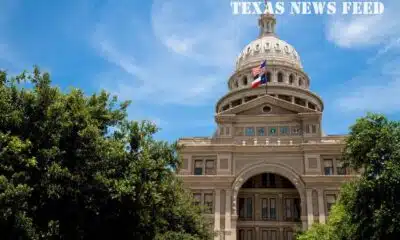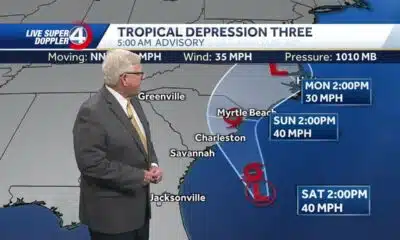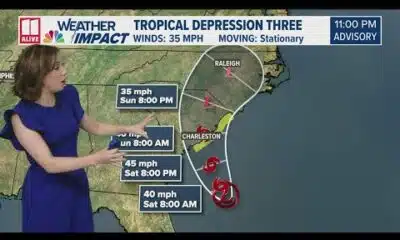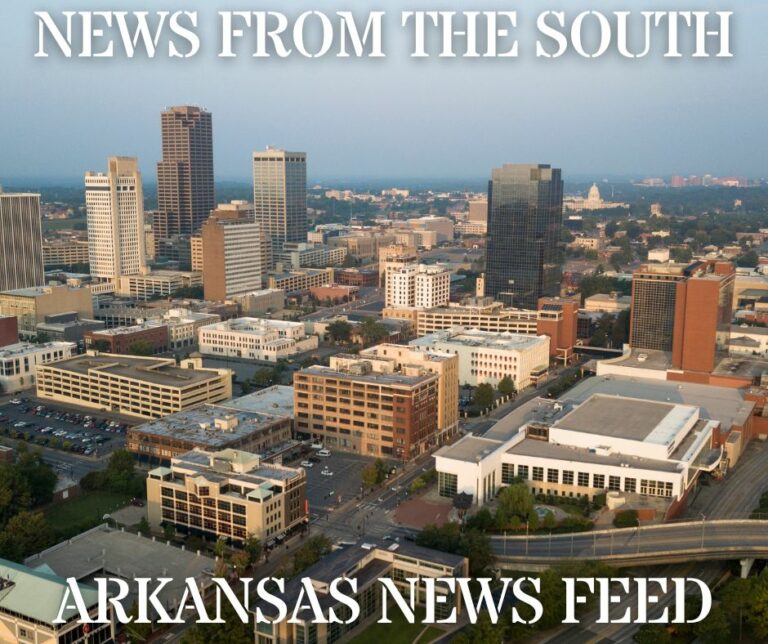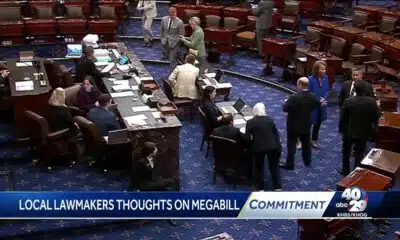News from the South - North Carolina News Feed
Budget proposal from NC Senate has Helene relief, income tax cuts
RALEIGH — In February, state economists warned of a looming fiscal cliff if the income and corporate tax rates continue to drop. Senate Republicans don’t exactly believe them. On Monday, they presented a budget proposal that doubled down on income tax cuts, not only ignoring advice to pause them, but also eliminating pesky revenue “triggers” getting in the way of further reductions.
The proposed budget would spend $32.6 billion in the first year and $33.3 billion during the second year (North Carolina operates on a two-year budget.). These are 5.8% and 2.1% year-over-year budget increases, respectively.
Overall, Senate Bill 257 shows “modest growth” to reflect North Carolina’s rising population and economy, Senate leader Phil Berger said.
[Subscribe for FREE to Carolina Public Press’ alerts and weekend roundup newsletters]
Tax policy and Helene recovery were the focuses of the 439-page proposal — the first major move in a months-long spending negotiation with the state House.
In a statement, the NC Budget & Tax Center, a nonprofit organization that documents economic conditions, blasted the proposal, saying it was “rooted in magical thinking and cruel cuts that will leave North Carolina unprepared for recessions, federal cost shifts and climate disasters.”
Meanwhile, the budget bill sped through a series of committee hearings Tuesday and will be fast-tracked to the Senate floor. If it passes the Senate, the House will likely make changes.
The final budget will almost certainly be crafted in a joint committee during the coming months.
Then, that version will go to Gov. Josh Stein’s desk, who may opt to sign or veto it, sending it back to the legislature.
Helene big part of budget proposal
It’s estimated that it will cost $60 billion to pay for Western North Carolina’s full Hurricane Helene recovery.
But the state doesn’t have that kind of money, Republican Sen. Ralph Hise, who represents nine counties on the state’s western border, told reporters during a press conference on Monday.
Instead, the working strategy is to load millions of dollars into the Hurricane Helene Disaster Recovery Fund, not to be spent now, but to be saved for future federal matching requirements.
The NC Senate’s budget proposal shifts $700 million from various state funds to the Helene Fund, but only reserves $25.5 million for specific purposes:
- $10 million to the Governor’s Recovery Office for Western North Carolina
- $5 million to the Division of Community Revitalization
- $8 million to the UNC Board of Governors to improve emergency response in Western North Carolina schools
- $2.5 million to the North Carolina community college system for enrollment loss
Hise said North Carolina is in a “good position” to meet matching requirements as it anticipates a variety of funds to come from the federal government.
The budget proposal also takes $634 million of underutilized transportation funds and reserves them for federal matching requirements for transportation infrastructure recovery.
It further divides $686 million in federal American Relief Act money between Helene-related clean water, drinking water and wastewater treatment system improvement needs.

Finally, it directs state agencies administering certain grant programs to prioritize applicants from the most impacted counties.
Since Helene, the state has used a significant portion of its “Rainy Day Fund.” So, the budget replenishes it to pre-Helene levels, to the tune of $1.1 billion.
Democratic Senate Minority Leader Sydney Batch isn’t pleased with the lack of actual spending, calling the budget proposal “a blueprint for neglect and cowardice.”
“Instead of investing in the people who make this state work, Republicans are continuing to hoard taxpayer dollars in a Rainy Day Fund — undermining critical agencies and ducking their responsibility by kicking tough decisions over to the House of Representatives,” she said in a statement.
Tax ‘triggers’
If you don’t meet your goals, well, why not just lower the goalpost?
That’s what Senate Republicans chose to do in their budget proposal. Under current law, the state needs to meet specific revenue “triggers” in order to drop the income tax rate another half percent each fiscal year.
Based on February’s Consensus Revenue Forecast, produced by the Office of the State Budget and Management, North Carolina met the revenue threshold for the first year of the biennium, but missed it by less than $100 million the second year.
While North Carolina is growing, the state budget office forecast that the downward pressure of income and corporate tax rate cuts, as well as the unpredictability of inflation and tariffs, would outweigh any revenue increases in fiscal year 2026-27.
The current income tax rate is 4.25% and is scheduled to drop to 3.99% in 2026.
After meeting the first-year trigger, the state is free to further drop the rate another half percent to 3.49% in 2027. But current law would force a pause in 2028.
The Senate budget works around that obstacle by eliminating the trigger from 3.49% to 2.99%.
The budget proposal leaves the next trigger, from 2.99 to 2.49%, in place for 2029, and adds two quarter percent drops the two following years.
Heba Atwa, the director of legislative advocacy and campaigns for the NC Budget & Tax Center, spoke out against the proposed cuts in a Tuesday legislative committee.
She said rate reductions would cost $13 billion annually. Furthermore, Atwa argued that lawmakers weren’t adequately considering the potential loss of federal funds. Last year, North Carolina received federal funding in an amount equivalent to its entire state budget ($30.8 billion). The next two-year budget cycle may be different.
“Y’all will be left holding the bag when North Carolinians come to you and say, ‘What happened to our services and our programs?’” Atwa said.
Berger isn’t convinced federal cuts will actually happen, but his caucus is monitoring things.
“I think we’ll be able to, if necessary, make adjustments, but it’s our belief that we have adequate reserves to address any scenario that is likely to occur,” said Berger, a Rockingham County Republican.
While the Senate’s proposed budget doesn’t account for potential federal funding cuts, it does take inspiration from Elon Musk’s cost-cutting agency: the Department of Government Efficiency. It dedicates $5 million so that State Auditor Dave Boliek could oversee a state version of DOGE, aptly named the Division of Accountability, Value and Efficiency (DAVE).
DAVE would determine whether state agencies and their vacant positions are necessary as well as how effectively they spend money.
Unlike its federal counterpart, the state auditor would not have the authority to eliminate programs or spending, but could offer recommendations to the General Assembly, Berger said.
This article first appeared on Carolina Public Press and is republished here under a Creative Commons Attribution-NoDerivatives 4.0 International License.
The post Budget proposal from NC Senate has Helene relief, income tax cuts appeared first on carolinapublicpress.org
News from the South - North Carolina News Feed
Red flags when you're buying or selling a used car
SUMMARY: Buying or selling a used car this summer requires caution due to prevalent scams. July is peak season for used car transactions, attracting scammers targeting both buyers and sellers. John Matarice highlights how easy it is to fall for fake check scams, like Matt Nef, who tried selling a 1948 Packard and received a counterfeit check exceeding his asking price, with requests to send money to a shipping company. Similarly, buyer Dejon Wallace nearly lost $1,200 on a fake check from a seller on Facebook Marketplace. To avoid fraud, always meet in person, never cash checks and send money back, and avoid wiring funds to strangers.
July is typically peak season for buying and selling used cars. Anyone in the market for one or trying to sell their own should be wary of scams.
News from the South - North Carolina News Feed
What to expect traveling for July 4: roads, weather, air travel
SUMMARY: Many Americans are traveling extensively this July 4th, with airports and roads packed for the holiday weekend. However, severe weather is causing significant disruptions. In Texas, heavy rainfall triggered flash floods near Kerrville, leading to evacuations and multiple deaths. The Northeast also faces storms, resulting in over 100,000 power outages across New York, Pennsylvania, New Jersey, and Massachusetts. New Jersey reported at least three storm-related deaths. Despite weather challenges, air travel is expected to hit a record with nearly 6 million domestic passengers, while over 61 million are predicted to travel by car. Gas prices are at their lowest July 4th average since 2021.
While the airports and roads have been packed, severe weather has also been causing major problems. ABC’s Olivia Rubin has more.
More:
Download: https://abc11.com/apps/
Like us on Facebook: https://www.facebook.com/ABC11/
Instagram: https://www.instagram.com/abc11_wtvd/
Threads: https://www.threads.net/@abc11_wtvd
TIKTOK: https://www.tiktok.com/@abc11_eyewitnessnews
News from the South - North Carolina News Feed
A July 4th “must read”: The Declaration of Independence
SUMMARY: On July 4, 1776, thirteen American colonies declared independence from British rule, citing King George III’s repeated abuses and denial of rights. The Declaration of Independence asserts that all men are created equal, endowed with unalienable rights to life, liberty, and the pursuit of happiness. Governments derive legitimacy from the consent of the governed and must be altered or abolished if destructive to these rights. After numerous grievances—such as unlawful laws, taxation without consent, military oppression, and judicial manipulation—the colonies declared themselves free and independent states, pledging mutual support for their new nation’s liberty and security.
The post A July 4th “must read”: The Declaration of Independence appeared first on ncnewsline.com
-
News from the South - Louisiana News Feed6 days ago
Water company hiked sewage rates in Lafayette to state’s highest
-
The Center Square6 days ago
U.S. Senate prepares for passage of One Big Beautiful Bill Act | National
-
News from the South - Tennessee News Feed6 days ago
“Choose how you love:” Nashville Pride 2025
-
Mississippi Today5 days ago
Feds unfreeze $137 million in Mississippi education money
-
News from the South - Virginia News Feed7 days ago
Senate Republicans work through the weekend to pass Trump’s One Big Beautiful Bill
-
News from the South - Arkansas News Feed6 days ago
Thousands celebrate pride, progress at the 2025 NWA Pride Parade
-
News from the South - Arkansas News Feed6 days ago
Congress unlikely to enact ‘absolutely devastating’ Trump proposal to slash Pell Grants
-
News from the South - Arkansas News Feed6 days ago
Local Party Leaders Response to Trump's Bill





